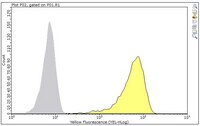MABF2031 Sigma-AldrichAnti-CD1b Antibody, clone BCD1b3.1
Anti-CD1b, clone BCD1b3.1, Cat. No. MABF2031, is a mouse monoclonal antibody that detects T-cell surface glycoprotein CD1b and it has been tested for use in Flow Cytometry, Immunohistochemistry, Immun
More>> Anti-CD1b, clone BCD1b3.1, Cat. No. MABF2031, is a mouse monoclonal antibody that detects T-cell surface glycoprotein CD1b and it has been tested for use in Flow Cytometry, Immunohistochemistry, Immunoprecipitation, Inhibition assays, and Neutralizing function. Less<<Recommended Products
Přehled
Tabulka spec. kláve
| Species Reactivity | Key Applications | Host | Format | Antibody Type |
|---|---|---|---|---|
| Gp, H | FC, IHC, Inhibition, Neutralization Assay | M | Purified | Monoclonal Antibody |
| Product Information | |
|---|---|
| Format | Purified |
| Presentation | Purified mouse monoclonal antibody IgG1 in PBS without azide. |
| Quality Level | MQ100 |
| Packaging Information | |
|---|---|
| Material Size | 100 μg |
| Global Trade Item Number | |
|---|---|
| Katalogové číslo | GTIN |
| MABF2031 | 04054839352614 |












 Antibody[210580-ALL].jpg)
